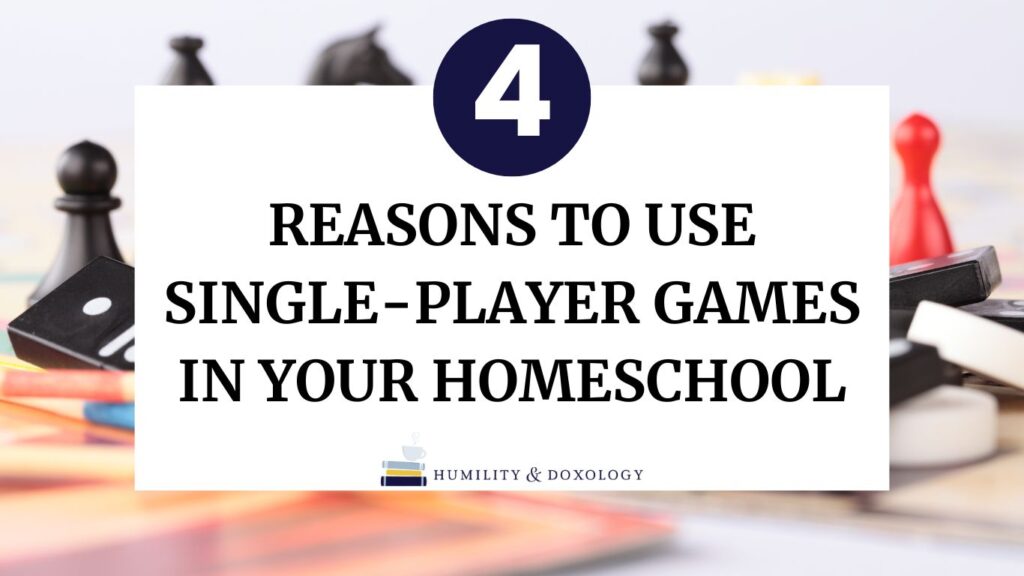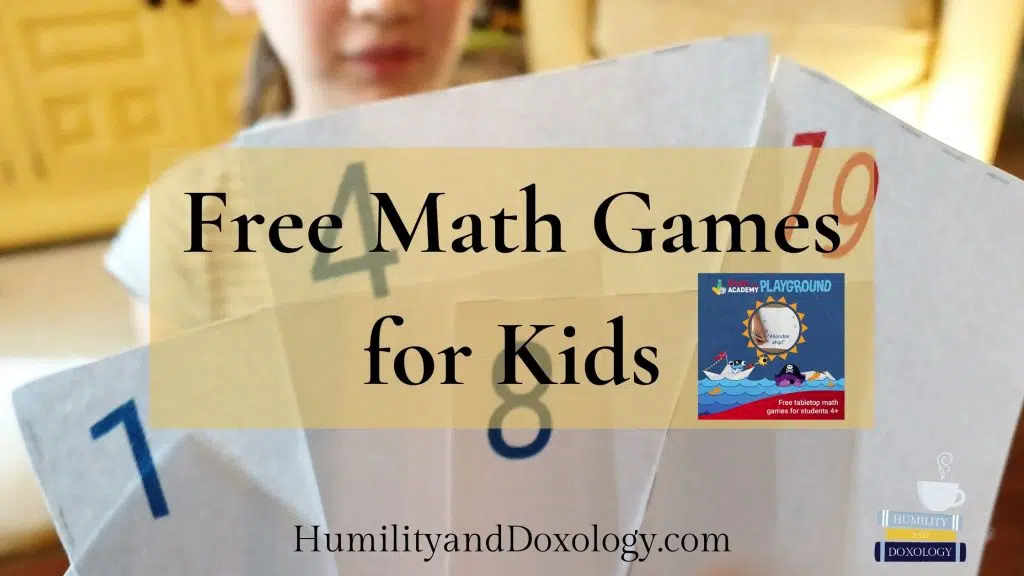Discover the enriching world of single-player games and how they can bring value to your homeschool day. In her insightful guest post, Melissa Brander shares four compelling reasons why incorporating single-player games into your homeschool curriculum can be both educational and enjoyable. From enhancing critical thinking skills to accommodating children at different learning levels, Melissa offers practical insights and recommendations, backed by her firsthand experience as a homeschooling parent. Let’s delve into the realm of single-player games and unlock new possibilities for learning and fun in our homeschooling journeys!
- What are single-player games?
- Single-Player Games Improve Critical Thinking and Reasoning Skills
- Single-Player Games Help When Your Kids Are At Two Different Places
- Single-Player Games Can Keep Your Kid Busy
- Single-Player Games Are A Lot of Fun
- Seven of our Favorite Single-Player Games
- You may also enjoy:

{This post contains paid links. Please see disclaimer.}
Are games a staple of your homeschool? My family loves to play games. I wasn’t homeschooled, but I have many fond memories of playing games with my family growing up. It seemed impossible to have a family gathering that didn’t involve playing games! Naturally, when I had my own kids, I looked forward to sharing my love of games with them. That’s when I discovered single-player games as an amazing homeschool tool.

What are single-player games?
Single-player games sound exactly like what they are; games designed to be played by one person.
Many single-player games are designed specifically for solo play. These usually come with a book or deck of cards with challenges. There are certain rules that have to be followed and the game shows you how to set up the different challenges that you then try to solve.
Other single player games are a variant of a multiplayer game. Looking for these options can help maximize your budget because then you have a game that can be played alone or as a family. You’ll know if games have a single-player mode because they’ll be listed on the box as having a minimum of one player.

Single-Player Games Improve Critical Thinking and Reasoning Skills
What makes single-player games different from games made up by your children? After all, any game can be a single-player game if only one person is playing it. The real magic is in the challenge.
Every game has a goal or challenge to be completed, and single-player games are no exception. Your child has to take the time all on their own to understand the challenge, reason out potential solutions, and think critically about how to achieve the goals of the game.
Critical thinking skills are like a muscle that needs to be exercised. Single-player games provide not only a fun way to do so, but an approachable way as well. The game approach makes it less intimidating for kids to build these skills – because they’ll be having so much fun.

Single-Player Games Help When Your Kids Are At Two Different Places
The more children you homeschool, the more likely it is that at least two of those kids will be in different stages of learning. It can be tricky to find the sweet spot where every kid in your family is challenged but not overwhelmed by a multiplayer game.
Single-player games come in many varieties, from beginner to advanced. Even within many single-player games there are different levels of challenge. Many even build, starting out easy and then getting harder. This helps you to find a game that will be the right level of challenge for your child.
Multiplayer games with a single-player mode can also help your child understand the game in a lower stress environment, without the pressure of having to compete. Of course, not every game you own needs to have a single-player mode, but it wouldn’t hurt to have a few around.

Single-Player Games Can Keep Your Kid Busy
Often, when you are homeschooling multiple children, you’ll need some one-on-one time to focus on just a single child at a time. During that time, your other child(ren) may need some help finding something appropriate to do. Single-player games can be a great way to keep your kid occupied!
There are also other times that single-player games work well. Single-player games can be used to keep a fidgety child’s hands busy during read aloud time. They also work to occupy your kid when you are doing those necessary but time-consuming tasks of running a household, like making dinner or making phone calls.

Single-Player Games Are A Lot of Fun
Single-player games are just fun! At every stage, single-player games have remained an option that my kids love. The variety of games available means that we can find games for every stage. Even when we don’t have time to sit down and play a multiplayer game, we can often pull out a singleplayer game.
Seven of our Favorite Single-Player Games
While you may be familiar with Solitaire as a single-player game, there are many more options these days. My kids and I worked together to come up with this list of our favorites.
- Colorku – If your kid likes sudoku, this game is sure to be a hit. It takes sudoku and changes it so that instead of working with numbers, you’re working with colors. Ready for the next level? Color Cube Sudoku takes it even farther, with cubes you need to flip to find the side that works.
- Walk the Dog – In this game, you have dogs with different lengths of leashes that you have to arrange to solve the puzzle – without getting them all tangled up!
- Kanoodle – Kanoodle is our favorite travel-sized single-player game. The small footprint makes it easy to slide into a bag or backpack.
- Cat Crimes – If your child likes Clue, this single-player game is a good whodunit type of game!
- Squirrels Go Nuts – If you remember those puzzles from your childhood where you slid around pieces to make a picture, this game reminds me of that. Except, instead of forming a picture, you’re sliding around squirrels and trying to get them over a hole so they can hide their nut for winter!
- Tiny Towns – This multiplayer game about building your town has a single-player mode, to try and get your personal best score.
- Shifting Stones – This beautiful multiplayer game of changing patterns has a single-player mode.
Single-player games can make a great addition to your homeschool. Not only can they serve practical purposes, like keeping your kid busy, but they can also be a lot of fun. All while growing your child’s critical thinking skills!

Melissa Brander is the founder of Pocket Homeschool and the SMART Homeschool Society. She focuses on helping homeschool moms feel enough, recognize their strengths, and equip themselves with lifelong learning in order to homeschool successfully by providing SMART resources that are simple to implement, meaningful family experiences, academically oriented, reasonably priced, tools for explorative learning. She lives in the Midwest with her husband and their two boys who have been homeschooled their entire lives.
You may also enjoy:
- Free Math Games for Kids with Beast Academy Playground
- Homeschooling with Play, Curiosity, and Games (with Cait Curley)
- Lifestyle of Learning: Homeschooling an Only, Morning Basket Fun, and Gameschooling (an interview with Jessica Waldock)
- Free Typing Lessons and Games for Kids
- Top Resources For Learning On The Go
- The Homeschool Reset: Fall in Love with Learning Again






